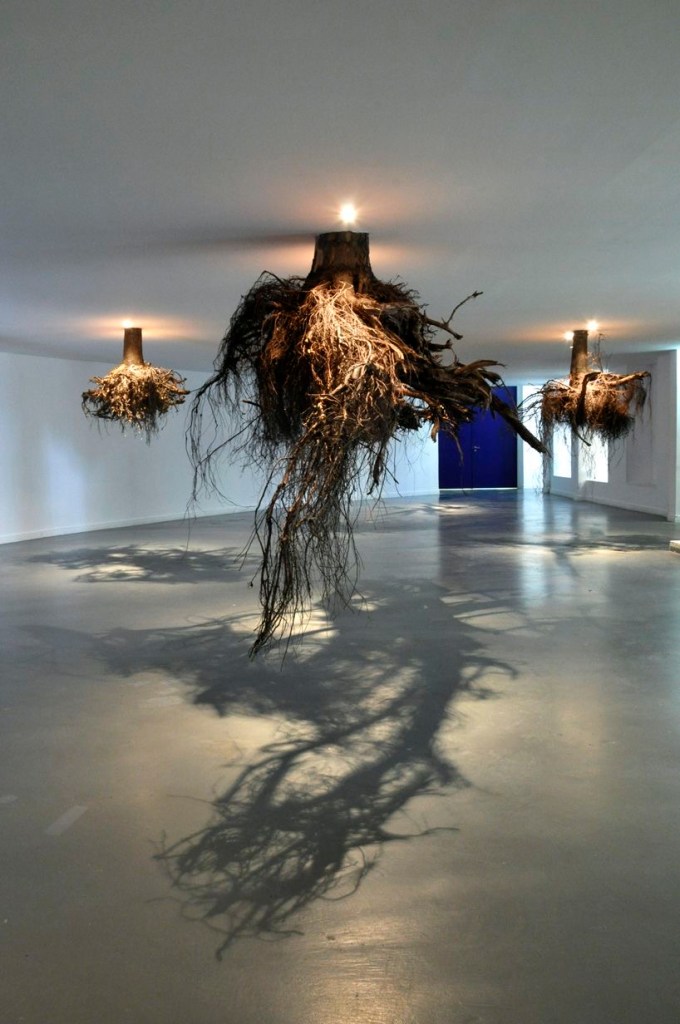
tree roots emerge from the ceiling in an installation by giuseppe licari
Trees have roots through which they absorb water and nutrients they need to grow. Some trees produce beautiful flowers and edible fruit. Without roots they would be unable to do so.
Even when we are unconscious of it, many of our ideas arise from roots ‒ not physical ones we can see from an uprooted tree, showing what has existed underground, but from our understanding of what we need and crave for.
Problems have roots. Some people say that money is the root of all evil. There is nothing evil about roots in the forest, park or garden; we mean root in the sense of “cause”.
Human evil is the root of war. If we conquered evil there would be no wars. Sadly, we know they rage in a world which would be pure and beautiful if evil, like a toxic weed, did not so effectively propagate its poison.
When we can’t see the forest for the trees, we don’t mean the forest disappears while the trees still stand. That would be impossible. We mean too much preoccupation with detail accompanied by failure to evoke the whole truth. When politicians address each other they sometimes focus on what matters to them, showing lack of awareness of what matters to the nation. Pretty and intriguing as an acorn is, it is no substitute for the entire oak tree.
Family trees are important to some of us. They are not, of course, trees; we call them such because their structure portrays branches and fruit (children). These hierarchical lists come to life in our imagination as we wonder what our ancestors were like, admire their achievements and seek to follow their good examples.
A root and branch review looks at its subject in minute detail. Visiting an art gallery with connoisseurs who review pictures and sculptures with perception, knowledge and understanding is enlightening. When we see a great play, a root and branch review enhances and refines our appreciation of it
Ambitious people want to grow, like healthy plants. Unlike plants, though, they can help themselves to develop. Poets derive inspiration from fellow poets, artists from fellow artists, and all of us from those who encourage us. To grow we have to start from somewhere; hence the need for roots. We might think of our families as such. They brought us into the world, and good families support children as they set out on their paths through life, like explorers forging their way through a forest, training their senses to perceive and interpret the lives they encounter.
Many contributors to Whispering Dialogue may think about going back to their roots, especially if they are in one country but their families and friends in another. We all have our ideas about our roots, comprising religious beliefs and practices, language and customs. Some of us feel homesick when far away from our roots. As humans, though, we are versatile. Even if we are uprooted from our habitats, we can survive and thrive. Proof is in the work and art in the United Kingdom of people who come here and contribute to this nation their experience and intelligence.
---------------------------------------------------------------------------------------------- *Material should not be published in another periodical before at least one year has elapsed since publication in Whispering Dialogue. *أن لا يكون النص قد تم نشره في أي صحيفة أو موقع أليكتروني على الأقل (لمدة سنة) من تاريخ النشر. *All content © 2021 Whispering Dialogue or respective authors and publishers, and may not be used elsewhere without written permission. جميع الحقوق محفوظة للناشر الرسمي لدورية (هَمْس الحِوار) Whispering Dialogue ولا يجوز إعادة النشر في أيّة دورية أخرى دون أخذ الإذن من الناشر مع الشكر الجزيل








